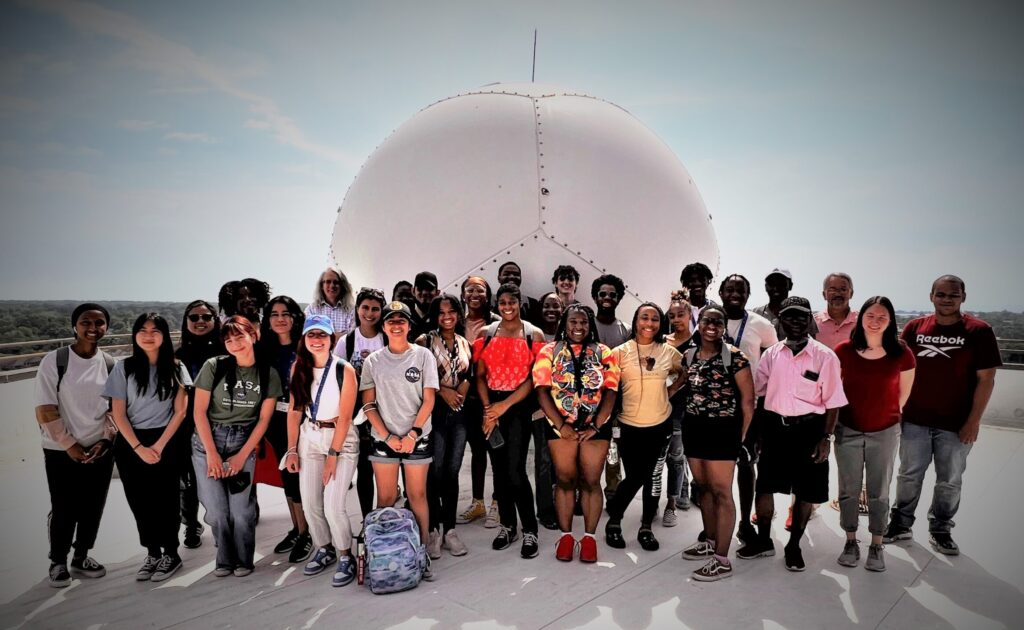
The Department of Atmospheric and Planetary Sciences (APS) provides an undergraduate minor in Atmospheric and Planetary Science, which was formerly named a minor in Space, Earth, and Atmospheric Sciences (SEAS) and is truly interdisciplinary in nature. The minor in Atmospheric and Planetary Sciences (APS) requires 18 credit hours from the following list of courses:
- 9-12 hours selected from: SCI 102; ESC 202; APS 101, 102, 105,
106, 303 (or PHY 303), 304, 333, 345, 399. - 3-6 hours selected from: CHE 509; APS/PHY 307; 351, 411.
- 3-6 hours selected from: APS 401, 410
Course Offerings
APS 101, Introduction to Weather and Climate
Credits 3.
Everyone is affected by the weather and climate. Dramatic uncontrolled events like hurricanes, tornadoes, blizzards, and heat waves often focus our attention. Other less dramatic, but important events like droughts, air pollution, and climate change also cause great concern. This course is designed to investigate many of these weather phenomena on a rational physical basis. This course satisfies the university general education core requirement in physical science.
APS 102, Natural Disasters
Credits 3.
The Earth is a dynamic, sometimes violent home. From superstitions involving angry gods and inscrutable fish, humanity has progressed to a thorough understanding of the dramatic and sometimes deadly natural phenomena we are subject to. This course examines our physical understanding of these processes, our ability to forecast and mitigate them, and appropriate precautionary measures. Along the way we will explore basic geophysics, atmospheric physics, and planetary science topics. This course satisfies the university general education core requirement in physical science.
APS 105, Astronomy of the Planets
Credits 3.
An introduction to astronomy suitable for all students. The earth in space. Seasons, orbits, the sun and planets. The history of the earth and planets. NASA’s exploration of the solar system with telescopes and spacecraft. Course includes evening observing with telescopes at Turner Observatory. This course satisfies the university general education core requirement in physical science.
APS 106, Astronomy of the Stars and Galaxies
Credits 3.
Second semester to Physics 205. The Sun and stars. Supernovas and black holes. The Universe and its origin and evolution. The Big Bang theory and cosmic inflation. NASA’s space telescopes. Course includes evening observing with telescopes at Turner Observatory.
APS 303, Meteorology
Credits 3.
Topics include the weather and the properties of the Earth’s troposphere. Some fundamental aspects of atmospheric science such as scale heights, lapse rates, and hydrostatics are covered in this course. Corequisite: PHY 203 or permission of the instructor.
APS 304, Earth and Planetary Science
Credits 3.
Geology and history of the planets of the solar system. The atmospheres of the Earth and planets, emphasizing Venus, Mars and Jupiter. The greenhouse effect and the ice ages. Recent discoveries involving planets orbiting other stars. Includes a student project involving atmospheric physics and computers. Prerequisite: MAT 130 or 151, PHY 201 or 203, Corequisite: PHY 202 or 204, or permission of the instructor.
APS 307, Introduction to Space Sciences
Credits 3.
Topics include thermospheres, ionospheres, magnetospheres, the Sun, stellar atmospheres, solar wind, the influence of the Sun on planetary atmospheres, Sun-Earth connections. Prerequisite: PHY 202 or 204, SEA 206, MAT 130 or 151, or permission of the instructor.
APS 333, Astrobiology
Credits 3.
Topics include the definition of life, the evolution of life on Earth, life in extreme environments, potential locations for life elsewhere in the solar system, and in depth discussions concerning how one searches for life throughout the solar system.
APS 345, Atmospheric Physics
Credits 3.
Fundamental laws and concepts of thermodynamics and electromagnetic radioactive transfer considered in an atmospheric context. Application of these principles to a number of meteorological problems, including climate models, the global energy balance, atmospheric aerosols, lidar/radar backscatter and remotely sensed temperature fields. Prerequisite: SEA 303, MAT 130 or 151, PHY 202 or 204 or permission of the instructor.
APS 351, Remote Sensing
Credits 3.
The course describes the science of passive and active remote sensing and their application to the geosciences. Remote sensing applications to be discussed include climate change, atmospheric chemistry and dynamics, air and water pollution, land use, and seismic studies. Topics will include conception of an ill-posed problem, retrieval algorithms, error analysis, and data validation. Prerequisite: SEA 345 or permission of the instructor.
APS 399, Atmospheric and Planetary Science Seminar
Credits 1.
A seminar course on a topic related to space, earth, and atmospheric sciences. Faculty, students, and invited speakers will prepare and present material related to the topic. May be repeated for a total of up to 3 credits.
APS 401, Atmospheric and Planetary Sciences Research
Credits 3.
Students will perform geoscience research with a mentor. The student will be responsible for writing a short proposal on an atmospheric research project, gathering the necessary data, writing a short research paper, and presenting the research to their peers and interested faculty and staff at a departmental colloquium. Corequisite: APS 307, 351 or CHE 509 or permission of the instructor.
APS 410, Atmospheric and Planetary Science Data Analysis Techniques
Credits 3.
Probability and statistics applied to climatology and meteorology. Discrete and continuous probability distributions of meteorological variables examined. Regression analysis applied to satellite data. Smoothing and filtering processes. Introduction to time series analysis. Co-requisite: SEA 307, 350, 351 or CHE 509, or permission of the instructor.
APS 411, Topics in Atmospheric and Planetary Science
Credits 3.
This course will examine selected topics that are the focus of current research and/or recent publications in space, earth, and atmospheric sciences. A lecture or seminar format may be used. Topics to be discussed will vary from year to year.
*APS minor courses at HU.
